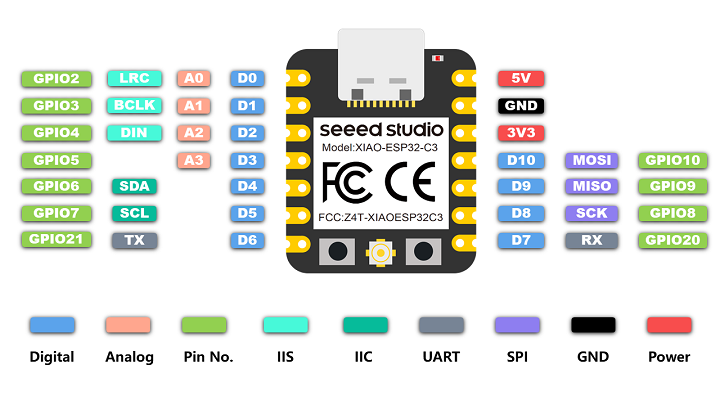Difference between revisions of "XIAO ESP32C3"
Jump to navigation
Jump to search
Blwikiadmin (talk | contribs) |
Blwikiadmin (talk | contribs) |
||
| Line 18: | Line 18: | ||
* 44 μA (deep sleep mode), with 4 working modes available | * 44 μA (deep sleep mode), with 4 working modes available | ||
* 11 GPIO pins: | * 11 GPIO pins: | ||
| − | + | ** 4 x 12-bit analog inputs | |
| − | + | ** 11 x PWM outputs | |
| − | + | ** Hardware I2C port | |
| − | ** 4 x 12-bit analog inputs | ||
| − | |||
| − | ** | ||
| − | ** Hardware I2C port | ||
** Hardware UART | ** Hardware UART | ||
** Hardware SPI | ** Hardware SPI | ||
** Hardware I2S | ** Hardware I2S | ||
| − | * 3.3V regulator | + | * 3.3V regulator |
* Reset switch for starting your project code over or entering bootloader mode | * Reset switch for starting your project code over or entering bootloader mode | ||
* USB Type C connector | * USB Type C connector | ||
Revision as of 13:41, 8 July 2022
Features
- SeeedStudio XIAO ESP32C3 Product Page (New 2022-07)
- Wiki
- ESP32C3 Datasheet
- 32-bit RISC-V
- Single Core
- Floating Point Unit
- Up to 160 MHz
- 400 KB SRAM
- 4 MB Flash
- 2.4GHz Wi-Fi subsystem
- U.FL antenna provided that supports WiFi/Bluetooth connection over 100m
- Supports Station mode, SoftAP mode, SoftAP & Station mode, and promiscuous mode
- 21 x 17.5mm overall dimension
- 44 μA (deep sleep mode), with 4 working modes available
- 11 GPIO pins:
- 4 x 12-bit analog inputs
- 11 x PWM outputs
- Hardware I2C port
- Hardware UART
- Hardware SPI
- Hardware I2S
- 3.3V regulator
- Reset switch for starting your project code over or entering bootloader mode
- USB Type C connector

